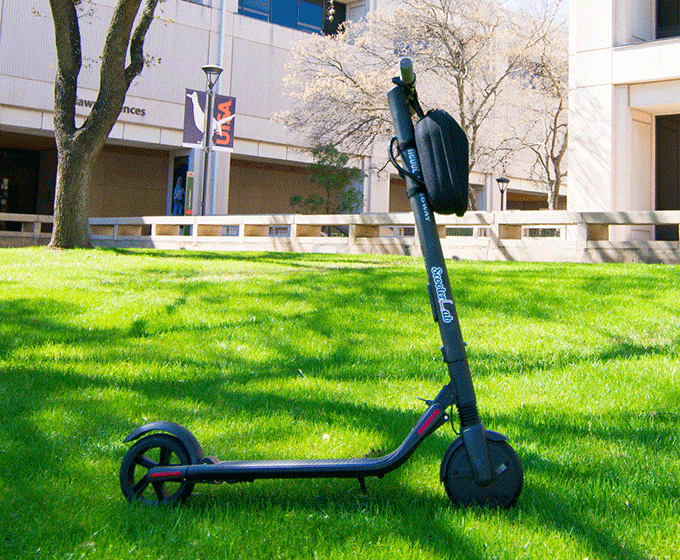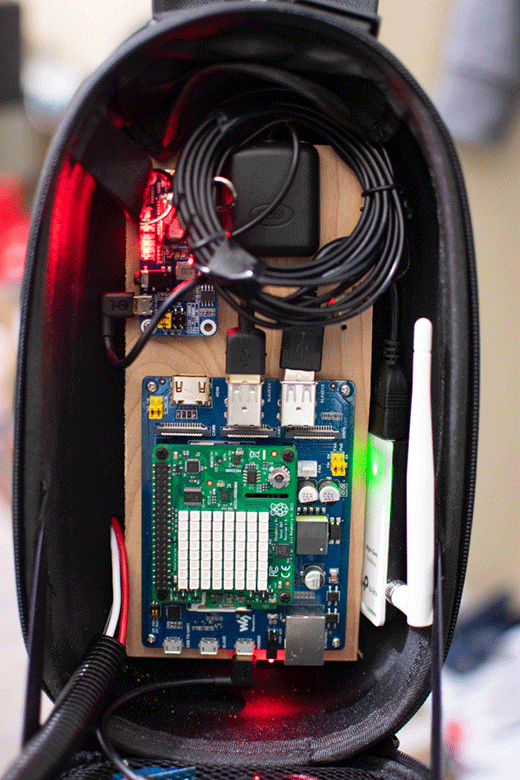
JUNE 30, 2021 — In our data-driven society, a close call with a speedy campus scooter during the fall 2019 semester sparked an innovative idea. Murtuza Jadliwala, assistant professor in the UTSA Department of Computer Science, was nearly hit by a e-scooter rider that day, but the incident inspired the creation of a new university laboratory.
Scooters are a preferred means of transportation for many people, especially those of younger generations. The increased use of e-scooters and lax oversight led to many accidents across the country and new or enhanced regulations in many communities. Despite his near collision, Jadliwala wasn’t interested in taking them off campus. He instead had an epiphany that this 21st century form of micro-mobility could be a vehicle for change.
“When I saw all these scooters on campus, I realized they not only carry people, but can also carry sensors that can help us collect data, which is great for all these technological advances we want to make,” Jadliwala said. “That also got me thinking that by obtaining data from them, we can study the impact of scooters on pedestrian safety.”
So, in effect, Jadliwala created a UTSA research laboratory operation called ScooterLab. Funding came from a $100,000 grant from the National Science Foundation (NSF) for a one-year pilot program to develop the concept. Other co-principal investigators include Greg Griffin, assistant professor in the UTSA Department of Urban and Regional Planning; Sushil Prasad, assistant professor in the UTSA Department of Computer Science; and Anindya Maiti, assistant professor in the University of Oklahoma Department of Computer Science.
Jadliwala and his team’s goal in this project is to turn the UTSA Main and Downtown campuses into rolling data laboratories. ScooterLab’s first two-wheeler was purchased off the shelf. But the heart of the operation is a small computer attached to the scooter. Jadliwala enlisted the help of UTSA doctoral student Raveen Wijewickrama to design and build the first data-gathering device. He used readily available parts that include a Raspberry Pi computer with several sensors attached, powered by a small battery.
“The sensors can collect GPS location, exploration and audio data that connect to our test phone through Bluetooth,” Wijewickrama said. “We can download the data from our phones for analysis. This is just a prototype. Our next version will have the capability of transmitting the data to a collection center through a 5G transmitter.”

The ScooterLab team is already working on a 2.0 version of the scooter’s computer. In addition to a 5G transmitter, improvements will include a weatherized outer case and enhanced computer design. The 5G transmitter will send data from all scooters to a centralized server located on campus.
“Our NSF funding is a small planning grant, which will enable us to think about these issues, get feedback from other researchers and develop a research community around ScooterLab,” Jadliwala explained. “Effectively, we are trying to start a small scooter company on campus, which is not a trivial task. Another consideration with micro-mobility data is you can figure out where a person lives, when he goes to work, his preferences, what he likes to eat—things like that. Collecting data in an ethical fashion and storing it securely, to ensure privacy of users, are grand challenges which we are still planning.”
This personal data is sensitive and highly sought by researchers or private companies. This is why Jadliwala feels it’s important to develop the program in house versus partnering with an established scooter business.
“Appropriating funding from government agencies or foundations gives us flexibility to do what we want to advance science without any strings attached,” Jadliwala said. “If we take funding from a private company, and they want us to do certain things, this could lead to an uncomfortable situation and create a conflict of interest with our research goals.”
If successful in securing additional funding from the NSF or another source, the first wave of ScooterLab two-wheelers will arrive on campus by mid-2022. The partnership with students will be like “quid quo pro.” An app will be developed to activate the scooters and they’ll get to use the scooters for little to no cost. In exchange, students agree to allow ScooterLab to use data collected from their rides for research and other scientific purposes.
Scooter data can pinpoint high traffic routes on campus. This could enhance safety by creating boundaries to separate pedestrians from scooter users. It could also help UTSA officials plan scheduled maintenance for highly trafficked routes. Lessons learned on how people and scooters can coexist at UTSA could also help other universities or municipalities manage scooter traffic and protect pedestrians.
On a grander scale, Jadliwala envisions an opportunity for ScooterLab to evolve as a hub for collaborative data gathering. Sharing the data with UTSA’s AI Consortium is one opportunity. Inviting the outside world to participate is also an option.
“It's a very multidisciplinary project where we want to collect data that will be used for a lot of different applications,” Jadliwala said. “In some sense, it's an open call for all the researchers in the community. If you think this kind of data is going to be useful for your research, join the ScooterLab community.”
UTSA Today is produced by University Communications and Marketing, the official news source of The University of Texas at San Antonio. Send your feedback to news@utsa.edu. Keep up-to-date on UTSA news by visiting UTSA Today. Connect with UTSA online at Facebook, Twitter, Youtube and Instagram.
Huddle Against Hunger is a fundraising competition with Texas State that benefits our Roadrunner Pantry. Donations this week will help UTSA earn additional prize monies provided by RBFCU.
In-Person and VirtualJoin UTSA Libraries for an update on federal public access policies and how the library can assist with compliance.
Virtual EventWe invite you to join us for Birds Up! Downtown, an exciting welcome back event designed to connect students with the different departments at the Downtown Campus. Students will have the opportunity to learn about some of the departments on campus, gain access to different resources, and collect some giveaways!
Bill Miller PlazaThere are many citation managers. Which one is right for you? This workshop will explain what a citation manager is and how it can help you organize your citations, insert citations as you write your paper, and generate your bibliography.
Virtual EventPubMed is an essential database for anyone conducting biomedical or health-related research. This workshop will teach attendees how to effectively navigate this free resource and locate peer-reviewed articles using advanced search features, MeSH subject headings, and Boolean operators.
Virtual EventIn this hands-on workshop, participants will learn to setup an EndNote library, save references and PDFs, and automatically create and edit a bibliography. Attendees are encouraged, but not required, to have EndNote already installed on a personal computer.
Virtual EventJoin UTSA Libraries and Museums to learn more about the publishing discounts available for UTSA researchers. Current agreements include Elsevier, Cambridge University Press, Wiley, and more. Bring your questions and feedback for the library as we continue to pursue partnerships with publishers to reduce costs for our researchers.
Virtual EventThe University of Texas at San Antonio is dedicated to the advancement of knowledge through research and discovery, teaching and learning, community engagement and public service. As an institution of access and excellence, UTSA embraces multicultural traditions and serves as a center for intellectual and creative resources as well as a catalyst for socioeconomic development and the commercialization of intellectual property - for Texas, the nation and the world.
To be a premier public research university, providing access to educational excellence and preparing citizen leaders for the global environment.
We encourage an environment of dialogue and discovery, where integrity, excellence, respect, collaboration and innovation are fostered.